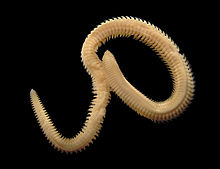Nephtyidae is a family of polychaete worms.[1] They are commonly referred to as catworms.[2]
| Nephtyidae | |
|---|---|

| |
| Nephtys hombergii | |
| Scientific classification | |
| Domain: | Eukaryota |
| Kingdom: | Animalia |
| Phylum: | Annelida |
| Clade: | Pleistoannelida |
| Subclass: | Errantia |
| Order: | Phyllodocida |
| Family: | Nephtyidae |
| Genera | |
Characteristics
editNephtyidae are pale, clearly segmented polychaetes with a small pentagonal prostomium with two pairs of small antennae. Their segments are little differentiated and have a rectangular cross-section.[3]
Nephtyids are active predators, with a strong muscular proboscis, armed with two well developed jaws.[4]
They can dig relatively fast through sandy sediments. They can also swim with sinuous movements.[5]
References
editWikimedia Commons has media related to Nephtyidae.
- ^ "Nephtyidae | NBN Atlas". species.nbnatlas.org. Retrieved 2019-07-02.
- ^ "WoRMS - World Register of Marine Species - Nephtyidae Grube, 1850". www.marinespecies.org. Retrieved 2019-07-02.
- ^ Jirkov, Igor A.; Dnestrovskaya, Nataliya Yu; Alalykina, Inna L. (2017-11-07). "Identification key to Nephtyidae (Annelida) of the Sea of Okhotsk". ZooKeys (684): 1–18. doi:10.3897/zookeys.684.12180. ISSN 1313-2970. PMC 5523181. PMID 28769731.
- ^ "Nephtyidae". www.annelida.net. Retrieved 2019-07-02.
- ^ "MarLIN - The Marine Life Information Network - A catworm (Nephtys hombergii)". www.marlin.ac.uk. Retrieved 2019-07-02.